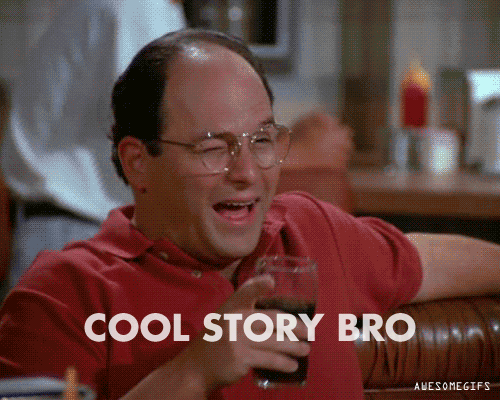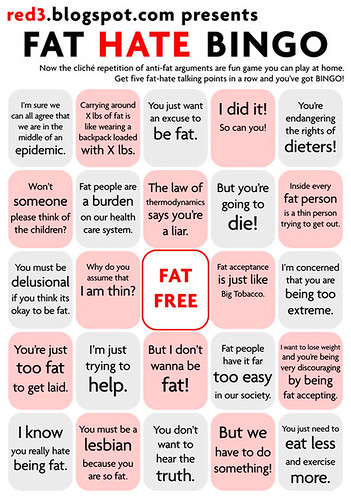Sunday night I returned from a long camping weekend off the grid to find a whole slew of angry comments on my most recent post, Your Fat is Not Your Fault. Apparently people get really mad when you deign to suggest that it’s okay to be fat on the internet.

Most of the comments were mean and/or stupid in that predictable way people like to be mean to fat people. Those were, and will continue to be, deleted. There were also some typical interweb lols like “I lost 100 lbs eating Paleo. Have you considered that everyone should just eat Paleo?”

There were, however, some comments written by actual thinking, feeling, people critical of my assertion that dieting almost always fails, and that obesity as a social problem that must first and foremost be addressed on a systematic, societal level. While I won’t address all of those arguments right now, I feel that they are secondary to (and distracting from) my overall point. My point–that it’s okay and important to forgive yourself for being fat–unfortunately got lost in the politics of fatness.
I’m not here to debate whether or not obesity is unhealthy (at least not today). I am here to argue that guilt, shame, and self-hatred are unhealthy. If it makes me a radical to suggest that guilt, shame, and self-hatred are significant problems then so be it. Body image disturbance (the term for all types of body image issues including dissatisfaction and distortion) is associated with eating disorders and low self-esteem. Self-hatred and low self-esteem keep people from reaching their full potential; they keep people from participating fully in their own lives and becoming productive, contributing members of society.
Think obesity is a drain on the healthcare system? Well, body image disturbance is a drain on every system.
Last year I wrote a post called Positive Body Image Won’t Make You Fat: The Case for Body Positive Health Promotion. Read it.
Having a positive body image won’t make you fat. Letting go of the guilt and blame will not keep you fat. In fact, it will help you begin to heal and one day embrace self-compassion and fun as motivators for healthy eating and fulfilling physical activity. And once you’ve embraced self-compassion and let yourself have fun-while-fat, you can start to make those positive lifestyle changes that will allow you live your life to the fullest, whether or not it results in weight loss. If you’re looking for help with this, there are some amazing books on the subject like Kate Harding’s Lessons from the Fat-O-Sphere and Linda Bacon’s Health At Every Size, as well as coaches like Isabel Foxen Duke and Sarah Jenks.
But forgiving yourself for your fat is especially hard when everyone wants you to fix it, apologize for it, or suffer for it. It’s especially hard when when everyone acts as if it’s as easy as “putting down the cheeseburger,” when in reality it’s a gargantuan, exhausting, and wholly demoralizing task that requires strict self-regulation of every thing you eat or do for the rest of your entire life. It’s not helpful to listen to the noise, ever, even if you do want to lose weight.
Unfortunately, fat shaming trolls can be found just about everywhere, including the medical and public health establishment. I’ve recently learned that they are especially virulent among the uber-libertarians (“fat people are destroying our economy because they’re lazy and looking for handouts just like homeless people are lazy and looking for handouts”) and men’s rights communities (“feminists are destroying my game by telling fatties it’s okay to stay fat”). Add ‘em to the bingo card, boys.

In order to “become healthy” — whether that means getting fit, raising your self-esteem, having more fun in your life, etc. — you need to practice self-compassion. Treat yourself the way you would treat someone you love. That means looking backwards and thinking about when you “became fat.”
- Were you a child? Not your fault.
- Were you a teenager? The teenage world is one of desperate insecurity; you coped the best you could.
- Were you in college? You were stressed and not sleeping and maybe partying a lot and still feeling invincible – it’s okay. As my fellow college health professionals often say, it’s “developmentally appropriate” behavior.
- Were you pregnant or did you just have a baby? Were you coping with depression or another mental illness or maybe a disability? Were you working long hours with no time for yourself? Were you dealing with an eating disorder?
You are not to blame for all the circumstances of your life. Give yourself the compassion and respect you deserve. You would not blame your best friend. Don’t blame yourself.
If anyone out there wants to make you feel bad about your body or feel bad about yourself because of your body correctly identify them for what they are: a troll. If they act concerned for your health, they are a concern troll.

Only you know what’s best for you. Only you can determine what it means for you to live a healthy, happy lifestyle.
Block out the noise. Delete the comments. Do you.


And if anyone has any questions about my comment policy, this is basically sums it up:

Filed under: Bodies, Feminism, Health Tagged: Body image, Health, Health at Every Size, Obesity, Self-esteem, Weight loss, Your Fat Is Not Your Fault
